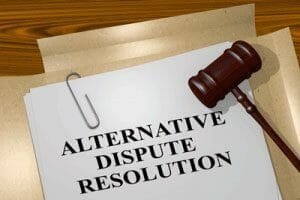
ADR (Alternative Dispute Resolution) is a method of settling civil disputes without the need for a courtroom.
Several advantages are available to disputing parties who can utilize ADR. First is the cost. Anytime two parties can settle any dispute out of court, the costs are substantially less. In addition to less financial burden, the time investment would also be much less.
All parties involved in the dispute would either come together in person, or sit with a negotiator/facilitator in order to come to an agreement in any alternative dispute resolution. Agreements can be binding when a contract is used or non-binding when it is in the form of advice or recommendations.
Most ADR begins with negotiation. This allows the parties to introduce possible ways to resolve their dispute. If the issues are not severe, normally negotiated resolutions are the fastest, easiest and least costly.
Mediation is essentially a negotiation with the benefit of a facilitator, or mediator. Mediation is less formal than the next step – arbitration and allows for some flexibility. A mediator may meet individually with the parties and try to come to an amicable solution.
Arbitration is the second step in the process. Arbitration is usually binding between the parties.
Arbitration involves people external to the issue selected to reach common ground and resolve the issue. Both parties would agree to the terms and this would become a binding contract enforceable by the courts.
Commonly used in labor disputes, conciliation also applies to other types of law. Similar to mediation, except that a facilitator usually has some authority to move the process forward to a solution.
.
Finally, in neutral evaluation, each party is allowed to present their case individually to an independent, third-party evaluator. The evaluator then renders a non-binding decision and offers some possibilities as to how the dispute might be resolved. Evaluators are typically selected because they are experts in a field relevant to the dispute, and neutral evaluation is commonly used in technical or complex disputes where specialized knowledge is required. Disputants will often use the evaluator’s advice as a basis for negotiation.
We have years of experience in all phases of alternative dispute resolution and can help provide the answers you need.
 Call
CallCall now to schedule your consultation 505.503.1637
